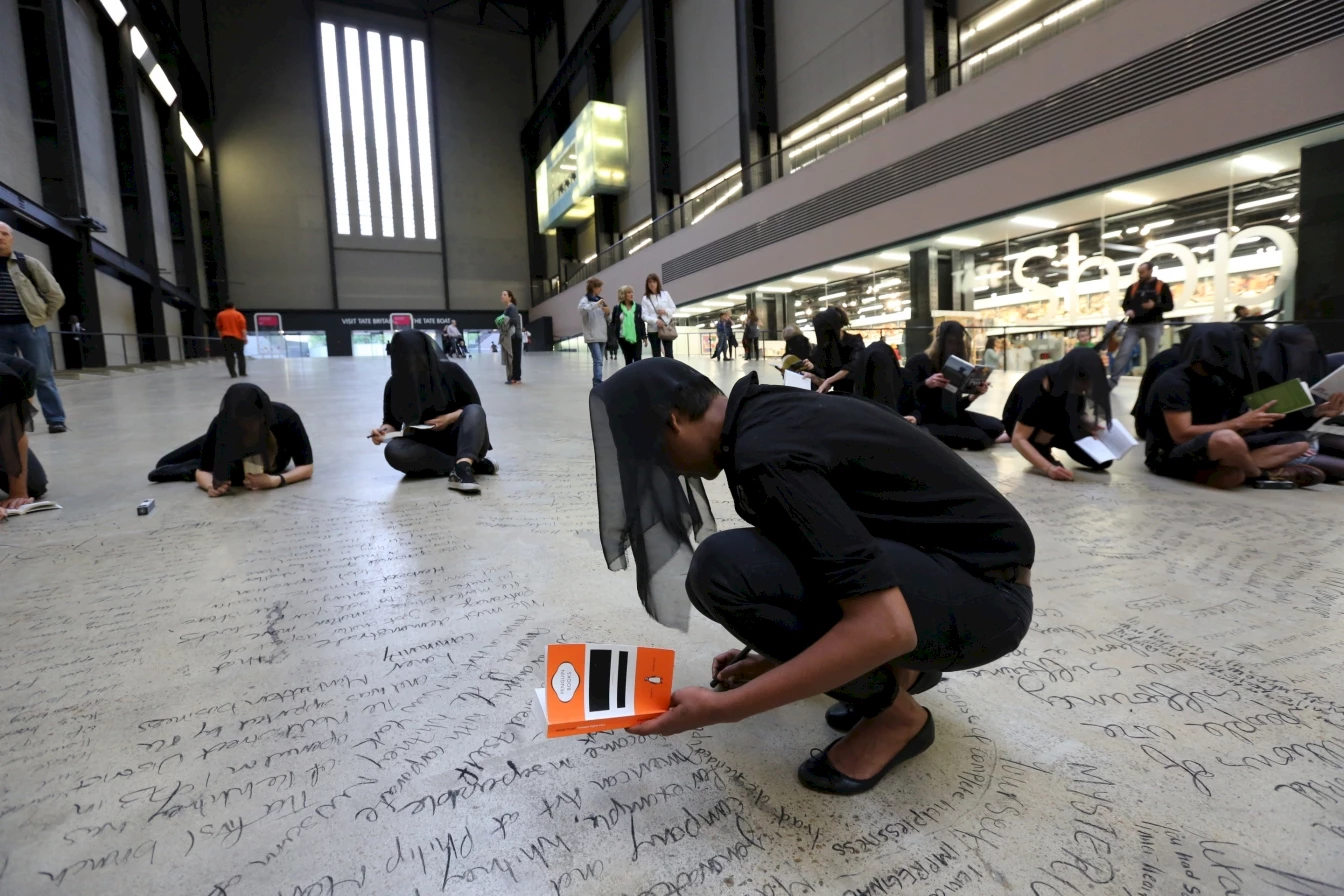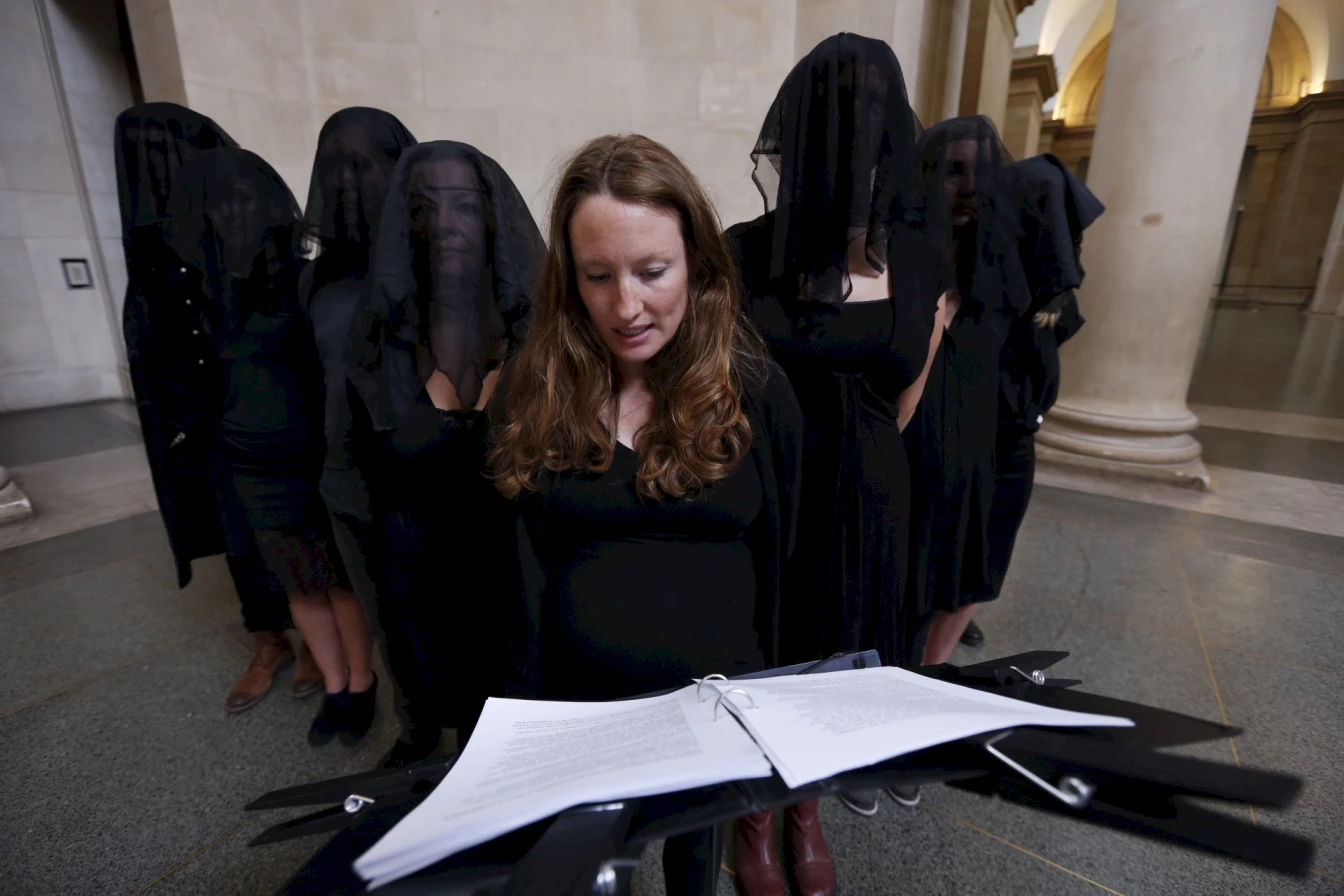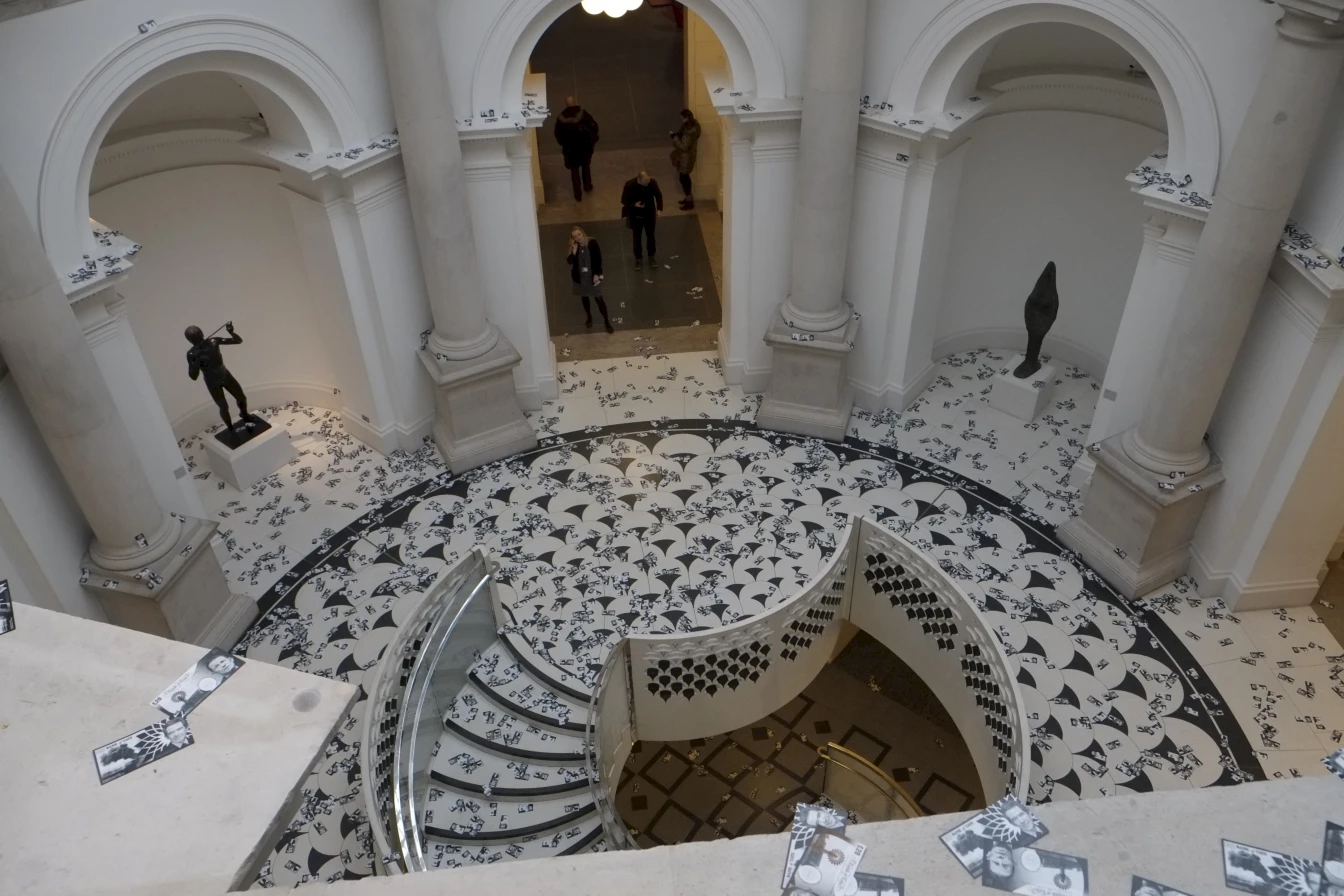
Liberate Tate, Time Piece, 2015. Photo: Martin LeSanto-Smith.
I'm standing in the gallery in front of the sculpture. She looks back at me, and into the distance, at the same time. In this space we all try to be timeless, me and the artist and the artwork; we all glance at the past, imagine the future, and reflect on both ad infinitum.
The artist imagined me standing here. Without knowing who would come, she thought of someone looking at her sculpture like this. The bust of a man's face, this object moulded by her hands, manifests this dialogue between me – the audience – and the artist who is now deceased.
It is impossible to know the future. But it is possible to predict, to assess, to gamble. Right now, in preparation for the Paris COP 21 climate talks in December 2015, papers are shared, meetings arranged, journeys across the planet organised, and shortly the negotiators' casino will gather to discuss what steps might be taken by global governments to stem the rising carbon dioxide levels in the Earth's atmosphere.
Extreme weather events have made the climate crisis more present and the need to act on the threat more urgent, yet still societies around the world struggle to find a suitable space, vehicle or mechanism to join together and act. Museums occupy a curious location in the hunt to crystallise concerns around climate change into action to create climate safety. Galleries and museums present visitors with social questions on gender, racism, the environment, economics, nationality and more. Cultural institutions become centre-points of social discussion and sites in which the seeds of social change can be sown.
As such, museums have a specific role to play in opening up dialogue around our active response to the prospect of climate change, which – for the survival of the homes, habitats and species of the planet – would be to try and prevent the worst impacts from unfolding. Museum directors hold the key to significant decisions around buildings, curating, learning programmes – and funding.
Right now, too many large cultural institutions around the world allow oil sponsors to brand their entranceways, their catalogues and their events. For the oil companies this provides a valuable social licence to operate, a guise of social acceptability masking the harmful impacts of the fossil fuel industry.
We are at a critical juncture in our societal evolution where we urgently need to address the issue of corporate power more broadly, and the power of the oil industry most specifically. There is very little precedent for the significant influence that oil companies wield in the political, financial and cultural spheres. A wide range of key figures involved in the struggle to prevent climate change have identified the influence that oil companies exert as being one of the single biggest obstacles to the urgent changes that are needed to make the transition to low carbon societies.

Liberate Tate, 5th Assessment, 2015. Photo: Martin LeSanto-Smith.
The power and influence oil companies have in the cultural sector stands side by side with the industry's actions to undermine climate legislation: from the United Nations climate talks, across the European Union, and down to our national governments. The trust companies like BP, Shell and Total garner from galleries is spent ten-fold in the access to key political figures and regulatory processes in parallel corridors of power.
And what of these companies in Paris? The original proposal which the UN put on the table to deal with climate change was a far more robust sculpture than what forms the centrepiece in Paris. The onus had been on those most responsible for carbon emissions to take the most action to stem the thickening clouds. Oil companies like BP and Shell, alongside a rogue's gallery of other corporates, were quick to form a highly effective lobby named the World Business Council for Sustainable Development. It successfully managed to replace mandatory emissions cuts with various flexible mechanisms and voluntary initiatives, effectively enabling the biggest polluters not only to avoid making cuts but in many cases actually make profits out of the fundamentally flawed carbon markets they had proposed.
BP and its allies have been similarly successful in obstructing effective climate policies in Brussels. In a recent ranking of European companies according to their records for lobbying and opposition to climate policies, BP was identified as the worst offender. According to Thomas Neil, the director of Influence Map, "BP has been consistently opposed to all the main forms of climate change regulation. There is very little positivity coming out of them and they are a board member of several obstructionist trade associations, some of which give a very dubious account of climate science." This version of BP's character is precisely what it seeks to mask through its allegiance with Tate.
Oil companies' influence in the corridors of power is equally well displayed at national government level. BP and Shell had more ministerial meetings with UK government officials than the entire renewable energy sector combined between 2010–2014.1
Tate and other cultural institutions are keen to stress the idea that oil money does not involve any influence over curatorial and programming decisions or any part of their operations. But there is enough evidence to suggest the contrary. In March 2015, Freedom of Information requests revealed Shell management questioned museum staff about the company's concern the climate change exhibit Shell sponsors might "create an opportunity for NGOs to talk about some of the issues that concern them around Shell's operations". Shell obviously has clear ideas about how it desires the Science Museum to present and promote the company, and has a notably casual assumption that staff would indeed take strict note of its directions.
Liberate Tate was born during a workshop at Tate in which staff requested participants not criticise the sponsors, underlining the evidence of their insidious influence. There are so many reasons why we might be critical of BP, the third largest emitter of carbon dioxide in the world. Its presence at Tate, and other oil companies similarly positioned in other galleries elsewhere, obscures and undermines the potential – and indeed responsibility – of cultural institutions to enable visitors to consider climate critically, and imagine a pathway to a climate-safe future. Our response is to create artworks in opposition to BP's presence, opening up a space of dissent and potential change within the gallery.
Earlier this year, we spilled the tiny amount of money Tate receives from BP in fake 'Bank of Tate' notes adorned with the effigies of the Director Nicholas Serota and the Chair of Trustees, ex-BP boss Lord John Browne. The performance took place after Tate was forced to reveal it receives merely half a percentage of its annual spending from BP. It took a three year legal battle for this figure to be revealed, presumably because it is so embarrassingly small. In June 2015, we performed Time Piece, a 25-hour performance in which over 100 people transcribed texts on oil, art and climate change in a rising tide, on the slope up Tate Modern's Turbine Hall. This was a call to gallery directors to drop BP ahead of the Paris climate talks, against the wishes of the Head of Health and Safety – a nice man named Dennis. Then in September 2015, Liberate Tate performed 5th Assessment, in which thirty or so performers dressed in black and wearing black veils, uttered the Intergovernmental Panel on Climate Change (IPCC)'s report in a speedy monotone. We were not attempting to elucidate or educate on the content of the dense, complicated scientific report. We wanted to make the sounds an object in the gallery space littered with the BP logo, challenging Tate to either remove the IPCC's weighty words in our unsanctioned performance, or eject the sponsor.

Liberate Tate, The Reveal, 2015. Photo: Martin LeSanto-Smith.
When politicians arrive at their meetings in Paris in December, they will feel the presence of hundreds of thousands of climate change and social justice activists on the streets around them. The role of social movements has been crucial in creating potential to halt climate change while the United Nations Framework Convention on Climate Change (UNFCCC) process has fumbled. The global divestment campaign and movement to end oil sponsorships are part of this push from the wider civil society to take the action on climate we truly need, and to usurp the power of the fossil fuel industry within our societies. Groups around the world who are campaigning to end oil sponsorship deals in their respective countries have announced they will join French artists, activists and gallery workers to oppose Total and Eni sponsorship at the Louvre with a protest during the climate talks. This sums up the challenge to the UNFCCC and museum and gallery directors worldwide: the people are leading the way to climate safety, will you follow?
We make monuments and artworks to mark, celebrate and learn about the past as we look ahead. While galleries carefully conserve artworks that hold sacred our stories for future generations, the climate movement is acting to protect the very landscapes we see in all those beautiful paintings. The climate talks and the mobilisations around them demand that cultural institutions separate themselves from the industry responsible for exacerbating climate change. Galleries are, in part, spaces to imagine the future, and what we need now is a culture beyond oil.
The views and opinions published here mirror the principles of academic freedom and do not necessarily reflect the views or positions of the L'Internationale confederation and its members.